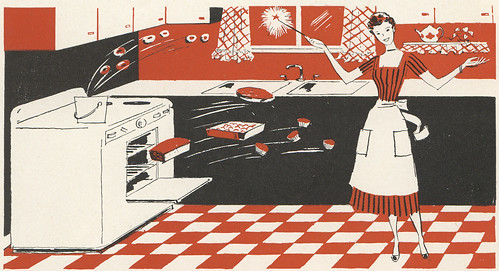This week I set myself a challenge to prepare a three course meal for four friends at my flat. The challenge was going to be tough as I would be preparing and cooking in the tiny kitchen environment, I would be using my small student budget to supply three courses for four people, and because I had to turn the messy lounge into a nice dining area with a pleasant ambience to entertain the guests in. Taking on this was essentially a decent responsibility for me, however the activity was a way to express myself and give the gift of nice food to my friends who I cared about and who I knew were studying hard for their exams. The activity would essentially be proving the opportunity to care and show respect for my friends, to communicate and share my sense of self, belonging and meaning that I have when cooking and fundamentally to express a sense of beauty.
In preparation for the evening I felt I was running around like a headless chook. From deciding on recipes, to purchasing the groceries, to arranging the lounge, to frantically cleaning the flat and to prepping the food, certainly made me feel a real sense that I was a domesticated house wife! Throughout the evening I went from being frustrated and stressed, to then slowly composing myself which enabled me to enjoy the process and express my creative cooking skills by producing delicious food and a wonderful evening. Reflecting on the experience really made me realize and understand how cooking enables me to express who I am as a person as I enjoy caring for others, cooking unique foods, bonding with friends and shearing stories over a delicious meal. My friends have always said that I identify with the role of a true housewife, and my dinner party really enabled me to express that domesticated role within me.
This experience I felt related well to the article “Are we selling out on domesticated life”. Fitzherbert (1882) expressed how women in the first wave of the early European settlers to New Zealand were required to return to a domesticated level of organization after relying on servants to provide for them. These women who had supervised servants before had to learn to cook, clean, do laundry, and ultimately care for their families which was necessary for their survival. I feel I am lucky to have learnt my domesticated cooking and cleaning skills from a young age where I don’t need to rely on others to do things for me. I also enjoy these tasks and don’t perceive them to be activities of labour, but that of a therapeutic way to express myself. These essential life skills and knowledge I have already gained will support me in the future when I have my own family to cook, clean and care for.
To finish off, here is a quote for those of you out there to ponder who can’t yet see your need and connections with cooking and other domesticated tasks….. “It is wonderful how, in a few months, you will find labour a pleasure and health a thing to be felt and a cause of thankfulness” (William, 1883). So stick it out and you may be surprised as to what cooking can bring to a person’s life :)
References:
Fitzherbert, J. (1882). The book of Husbandry. Reprinted from the edition of 1534, ed. W.W.Skeat.London: Published for the English Dialect Society.
William. (1883). Facts: Or, the Experiences of a Recent Colonist in New Zealand. Published by William, Willow Grove, Yalding, Kent.


No comments:
Post a Comment